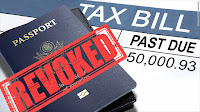The IRS published on its website, Update on Passport Certifications and Taxpayer Advocate Service, that it is stopping its temporary program under which it wasn't certifying taxpayers for passport revocation etc., if the taxpayer had delinquent tax debt but also had an open Taxpayer Advocate Service (TAS) case.
On September 9, 2019 we posted, IRS to Temporarily Stop Passport Revocations for Taxpayer With Cases at the TAS, where we discussed that in a memorandum to Tax Advocate Service (TAS) employees, the TAS has stated that the IRS will temporarily decertify taxpayers with open TAS cases. Decertification means that taxpayers with seriously delinquent tax debts will, temporarily, not be at risk of having their passports revoked by the State Department merely because of those seriously delinquent tax debts.
To Obtain Or Renew A Passport.
-
Who is in bankruptcy,
-
Who is identified by the IRS as a victim of tax-related identity theft,
-
Whose account the IRS has determined is currently not collectible due to hardship,
-
Who is located within a federally declared disaster area,
-
Who has a request pending with the IRS for a good faith installment agreement,
-
Who has a pending good faith offer-in-compromise with the IRS, or
-
Who has an IRS accepted adjustment that will satisfy the debt in full.If You Have Seriously Delinquent Tax Debts,
You Should Consult with Experienced Tax Attorneys!
Read more at: Tax Times blog

















